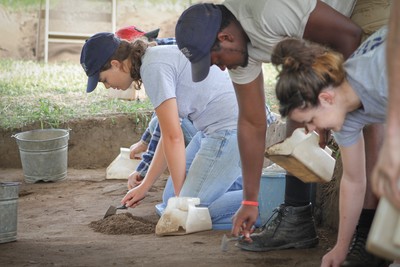Longwood University’s archaeology field school recently became one of the fewer than 10 percent of field schools in the world to be certified by the Register of Professional Archaeologists (RPA).
The Dr. James W. Jordan Archaeological Field School is now one of only 17 field schools among the 189 listed field schools worldwide, and the only one in Virginia, to be certified by the RPA. Certification aims to ensure that field school students are trained in "the discipline’s highest standards of research and site stewardship," said Dr. Brian Bates, field school director.
"This distinguishes our students and will give them an advantage in the workplace," said Bates. "Anyone hiring them will know that they’ve been trained in the highest standards, which have been reviewed by an external entity."
Only 15 field schools in the United States, one in Ireland and one in Sweden are RPA-certified. The RPA, which promotes the establishment and maintenance of professional standards, began certifying field schools in 2012.
The certification, which is good for two years, was approved by a review committee of six practicing archaeologists. Bates was notified of the certification March 12, capping a monthlong application process during which the committee reviewed the field school’s research methods, syllabus, curriculum and daily schedule.
Certification evolved from a desire by the four national archaeological organizations supporting the RPA that each excavation be done professionally and that fieldwork include a serious research commitment.
"We’re not just digging but also doing formal lectures on field methods and lab methods," said Bates, a 1992 Longwood graduate who participated in the field school as a student. "It’s not enough to go out and conduct a dig. The RPA wants more than technical proficiency. They want it framed within a research project; they want students learning about the scientific method. They also want to make sure we’re being good stewards of our cultural resources, so what we’re doing with the artifacts once they’re out of the ground is also important."
The supporting organizations are the Society for American Archaeology, the Archaeological Institute of America, the Society for Historical Archaeology and the American Anthropological Association.
Bates, an RPA member, is pleased that every RPA-certified field school is eligible for a $1,000 scholarship from one of the sponsoring organizations, which can be used to offset student expenses.
The four-week field school, founded in 1980, consists of a beginning course (Field Methods in Archaeology) and an advanced course (Organization and Execution of Archaeological Research), each worth six credits, which run concurrently during the first summer school session. About 20 students participate annually. Some 17 students are currently signed up for this year’s field school, to be held May 18-June 12. The field school is open to students in any major.
The field school has excavated since 1998 in Charlotte County at a 1,000-year-old Sapony Indian village along the banks of the Staunton River. Field school students also have conducted research at sites throughout Virginia, primarily in southern Virginia but also on the Northern Neck, as well as overseas, including Tortola in the British Virgin Islands.
The Archaeology of England course, which Bates and Dr. James Jordan have taught for the last eight years, usually during winter intersession, is an extension of the field school. Also, 41 anthropology students are going April 17-19 to Henricus Historical Park in Chesterfield County to conduct ground-truth testing of the geophysical research they did there in fall 2014.
The field school was established by Jordan, now Board of Visitors Distinguished Professor of Anthropology, who directed it until Bates took it over in 1997. The field school was named for Jordan in 2012 by the Board of Visitors.



Leave a Comment